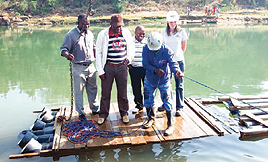KZN ROAD CONSTRUCTION SUCCESSES HIGHLIGHTED DURING
CONSTRUCTION WEEK
|

FROM LEFT - KZN Transport Department General Manager
for Strategic Planning: James Mlawu, Head of Department: Kwazi Mbanjwa
and General Manager for Implementation: Chris Hlabisa together with
construction workers inspecting a construction site as part of the
commemoration
of construction week.
|
|
KZN Department of Transport Head Dr. Kwazi Mbanjwa has expressed much optimism
about future development in KwaZulu-Natal. This optimism was clearly
demonstrated as the provincial Transport Department commemorated National
Construction Week (27 July to 3 August) and visited strategic road
construction projects in the province.
KwaZulu-Natal is regarded as a leader in the country when it comes to
training, promoting and engaging emerging contractors in the road
construction industry. During a special documentary on SABC's Channel
Africa Mbanjwa said that KZN was in the process of reaping the fruits of
the KZN Transport Department's vision of 'Prosperity through Mobility.'
"Through the Department's black economic empowerment programme known as
Vukuzakhe we have discovered many new road builders in the province who
come from the previously |
disadvantaged sectors of society, including black women," he
said.
"As the country is highlighting the importance of the road construction industry
without which there can be no development, we are proud of the fact that whereas
in the past one contract would be awarded to one established construction
company, we are now able to award one contract to several emerging contractors
and achieve the same results," Mbanjwa explained.
"The emerging contractors are able to produce the same quality of work, and
moreover the work is shared amongst different companies as opposed to just one
big company," he added. He said that in commemorating Construction Week, senior
departmental officials from the KZN Department of Transport had visited various
projects that the Department started at community level to see what the emerging
contractors were doing, with the intention of identifying problems experienced
on site and to see what can be done to resolve them. "Our main aim is to ensure
that we do not compromise on quality of the work," he pointed out.
The projects that were visited or acknowledged on Channel Africa included:
-
The recently-launched multimillion rand Sani Pass road upgrading project being
undertaken in conjunction with the national Department of Transport;
-
The upgrading of Main Road 577 which is part of the Inanda, Ntuzuma and
KwaMashu (INK) project that has been identified as a presidential node and of
which the first phase was officially opened recently.
-
Strategic economic routes and corridors in KwaZulu-Natal which were identified
for upgrading such as Main Road 235 (P235) from Hlabisa to Nongoma.
-
The Tale of Four Cities project - a corridor that links the major KwaZulu-Natal
cities of Durban, Pietermaritzburg, Ulundi and Richards Bay.
-
Main Road 68 from Mtentweni to Highflats.
These are just some of the key projects which will contribute to the growth and
development of KwaZulu-Natal and lead to economic prosperity. There are
approximately eight of these strategic economic routes and corridors that have
been targeted for development. Mbanjwa said Construction Week was also about
celebrating the achievements of the KZN Transport Department which has
been able to ensure that emerging contractors share in the road construction
business contracts awarded in the province.
He explained: "We are unbundling these contracts and instead of getting big
companies to do all the work, we are engaging emerging contractors who do almost
50% of the work that would have been done by one established company. For
example, 50% of the R520 million earmarked for the Main Road 577 project will be
earned by emerging contractors."
He said his Department was already compiling a data base of experienced and
competent emerging contractors in preparation for the construction work that is
due to happen as the country prepares to host the 2010 World Cup. "There is a
stadium and an airport that is to be built in this province and emerging
contractors need to be used.
"These emerging contractors must be supported and we have olicies in place to
ensure that they are involved in whatever government is doing. These visits
have afforded us the opportunity to identify the calibre of contractors we have
and who we could call upon to tender for future projects because we are talking
of billions of rands, not just millions," he said.
"All the established contractors started small; they did not start at the top.
They grew in time after getting the necessary experience and opportunities to do
bigger projects," he said.
"Our emerging contractor programme only started in 1998 but already we have
produced people who are now exiting the programme, and they can go and
tender for bigger projects. We had a backlog of about 12 000 kilometres of road
in the province and to date we have completed over 7 000 kilometres of this
backlog," he added.
He concluded: "We want good roads leading to the stadiums in 2010. What we
observed in Germany is that about 70 000 people per match go to the stadiums,
but the big screens attract up to 700 000 - so the roads must be good so that
people can enjoy the matches in 2010. We want to make ensure that our public
transport system is effective, including maritime and aviation. Our road
infrastructure must also be up to standard."

 back back
|
